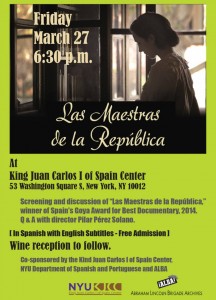Las maestras de la República
 [Welcoming remarks to screening of “Las maestras de la Républica” at the King Juan Carlos I of Spain Center, March 27, 2015. Followed by Q+A with the director, Pilar Pérez Solano]
[Welcoming remarks to screening of “Las maestras de la Républica” at the King Juan Carlos I of Spain Center, March 27, 2015. Followed by Q+A with the director, Pilar Pérez Solano]
On behalf of NYU’s Department of Spanish Literature and Portuguese, the King Juan Carlos I of Spain Center, and the Abraham Lincoln Brigade Archives, I welcome you to tonight’s screening and discussion of “Las maestras de la República” [“The Women School Teachers of the Republic”], winner of the 2014 Goya Award (Spain’s equivalent of the Oscar) for best feature-length documentary.
I think that all of us who closely follow current events in Spain probably share the feeling that we are witnessing the end of a historical cycle, and the beginning of a new phase, full of uncertainties, but also full of hope and promise.
Now more than ever, I think, we can clearly see the accomplishments of the regime that was established after Franco’s dictatorship, but we can also see with more clarity than ever some of that regime’s limitations and deficits. Identifying and analyzing those limitations is, I believe, an important task, one whose goal is in no way to discredit the gains made by democratic Spain after 1978, but rather to find ways of improving the quality of democracy in Spain now and into the future.
In the column of deficits, I would underscore two major topics which, because of how the Spanish transition was managed, remain marginalized in the awareness of many Spanish citizens. The first would be the issue of the victims of Francoist terror: the unresolved status of the 114,000 citizens who were executed and thrown into ditches and unmarked graves all over the country. The second topic, inextricably linked to the first, is the history of the Second Republic, a complex period which, for the sake of political expediency, has been marginalized in the national imaginary, reduced to a messy and turbulent period which supposedly “led” to the horrific Civil War, and which for that reason, is probably best relegated to oblivion. [How many military coups have been unleashed against democratic governments throughout history? Is the proper conclusion, then, that democratic governments cause coups d’état?] The experiment in democracy of Spain’s Second Republic, with all its lights and shadows, has been excluded from the more or less official narrative of Spanish democracy. It is curious to note, in this regard, that when speaking of post-Franco Spain, we almost always refer to a “transition to democracy” and rarely to a “recovery of democracy”. One of the great merits of “Las maestras de la República” is that it points to the very high price that Spain paid –and continues to pay– as the result of the amputation of the Republic from its national narrative.
If the history of the Second Republic has been marginalized from dominant versions of democratic Spain’s becoming, we could say that the story of women in the Republic has suffered a double marginalization; on the grounds of ideology, and on the grounds of gender. The film we are about to watch goes a long way toward redressing this neglect, as it reconstructs the challenges, accomplishments and sacrifices of an extraordinary group of courageous women who were committed to the values of public, free, non-religious education for all.
Film website here: lasmaestrasdelarepublica.com












